Introduction
In the rapidly evolving digital landscape, cloud transformation has emerged as a pivotal strategy for organizations seeking to enhance operational efficiency and maintain competitive advantage. As businesses increasingly migrate their applications, data, and workloads to cloud environments, they encounter a complex array of challenges and opportunities that necessitate expert guidance.
This article delves into the multifaceted nature of cloud migration, exploring its definition, the essential role of cloud migration consultants, and the myriad benefits it offers. Furthermore, it addresses the challenges organizations face during this transition and highlights emerging trends that are shaping the future of cloud consulting.
By understanding these dynamics, businesses can better navigate their cloud journeys and harness the full potential of cloud technologies.
Defining Cloud Transformation and Migration
A cloud transformation and migration consultant guides the strategic process of migrating applications, information, and workloads from on-premises infrastructure to online environments. This transition, as advised by a cloud transformation and migration consultant, goes beyond mere resource relocation; it necessitates a comprehensive reevaluation of service delivery and optimization. Various migration strategies, including lift-and-shift, re-platforming, and re-architecting, are employed by a cloud transformation and migration consultant to align with distinct business objectives.
Significantly, recent research indicates that by 2025, worldwide information is anticipated to reach an astonishing 200 zettabytes, with half of this information expected to be stored online. In fact, a significant number of surveyed businesses—about 50%—consider online computing as a modern data protection strategy, highlighting the critical role it plays in disaster recovery. As The Motley Fool highlights, "Established in 2003, Palantir generated $1.91 billion for fiscal year 2022, a 24% year-over-year increase, with $31 million in GAAP net income," demonstrating a successful company utilizing digital solutions.
Real-world instances show that entities can attain improved flexibility, scalability, and cost-effectiveness in their operations by employing a cloud transformation and migration consultant to implement these transition strategies. As the digitization of life and the connectivity of smart devices lead to an explosion of data generation, adopting digital transformation is not just advantageous but essential for remaining competitive in today’s dynamic landscape.
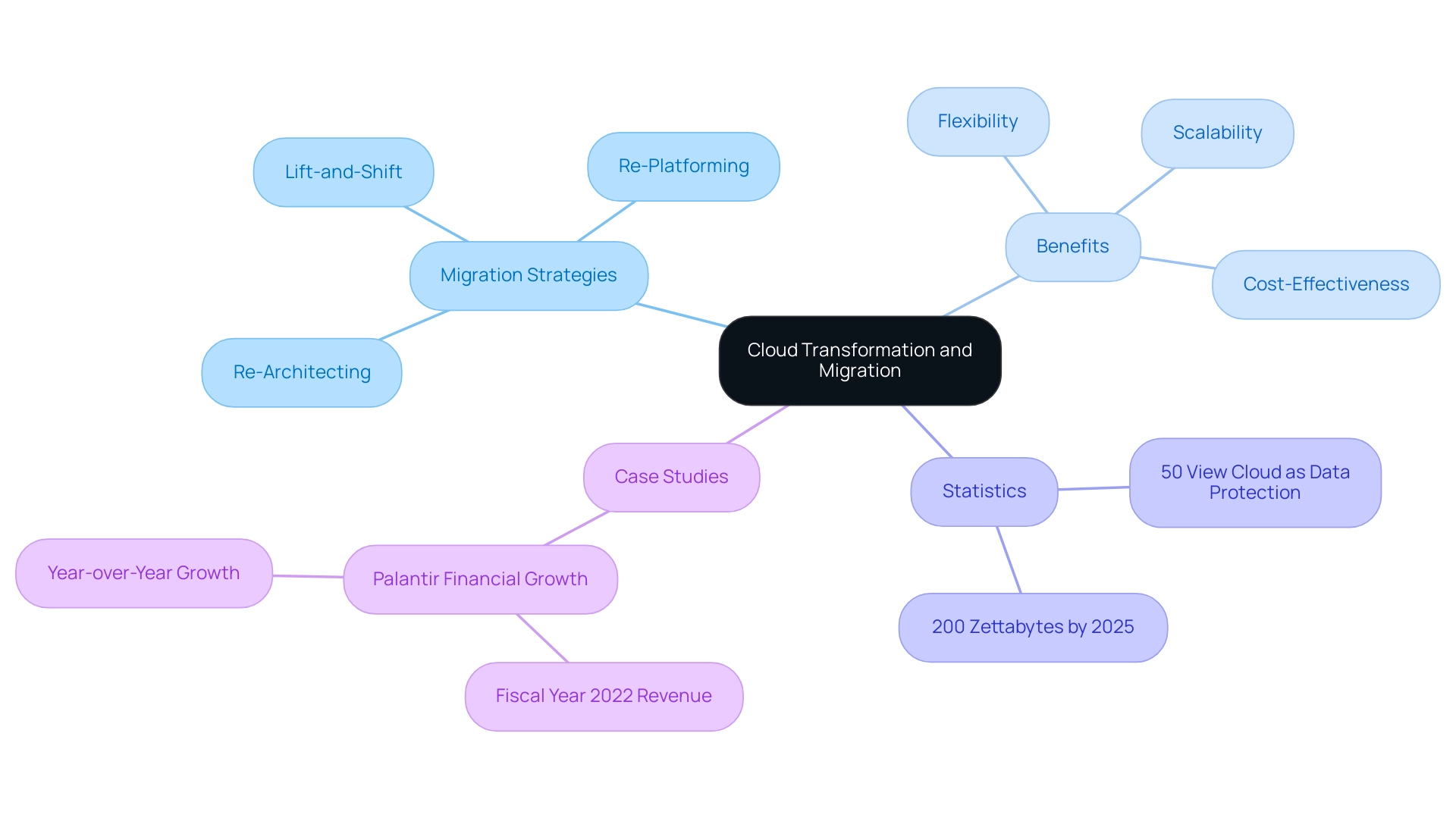
The Role of Cloud Migration Consultants: Responsibilities and Expertise
Experts in transitioning to online environments, such as cloud transformation and migration consultants, are crucial in assisting organizations with the intricacies of the process. Their main duties include:
- A thorough evaluation of current IT systems
- The suggestion of appropriate online solutions
- The development of transition strategies that align with overarching business objectives
With a significant increase in demand for skilled consultants—reflecting a broader industry trend—these professionals offer essential project management supervision to guarantee transitions are carried out efficiently and effectively.
Equipped with expertise in digital technologies, security, and compliance, migration consultants adeptly navigate the intricacies associated with adoption. They address not only technical challenges but also the change management needs that arise during the transition process. This is especially pertinent as a substantial majority of businesses (89%) are now utilizing multi-platform solutions to mitigate vendor lock-in risks and enhance resilience against outages, with 80% employing hybrid configurations.
Moreover, the competitive landscape is emphasized by the fact that Amazon Web Services (AWS) controls 31% of the infrastructure services market, highlighting the significance of strategic positioning in adoption. Additionally, the trend of generative AI adoption is noteworthy, with 82% of top performers having embraced it for modernization, compared to only 53% of other companies. This gap highlights the necessity for organizations to utilize experts in digital transformation to remain competitive in a changing technological environment.
As we consider the impact of these services, client testimonials provide real-world validation of STS Consulting Group's effectiveness. One client noted, "Using STS Consulting Group helped me save weeks of work. Their delightful level of quality and service is consistent and one of a kind. I can't recommend STS Consulting Group enough." Another client shared, "STS Consulting Group was the missing piece to my puzzle. From start to finish, they solved every problem and helped us achieve our goals in the most professional way possible."
These testimonials emphasize the transformative effect of working with committed specialists in transitioning to online services and correspond with the wider trends in technology adoption.
Additionally, as observed by Lawrence E. Hecht, “We don’t know how effective these FinOps teams are, but the report did claim that only 28% of spending can be categorized as 'wasted.' This emphasizes the significance of strategic financial supervision in digital operations, a vital field where cloud transformation and migration consultants provide essential support. As we approach 2024, the changing roles and responsibilities of the cloud transformation and migration consultant will keep influencing the environment of adoption, rendering their expertise essential for entities seeking to utilize digital technologies effectively.
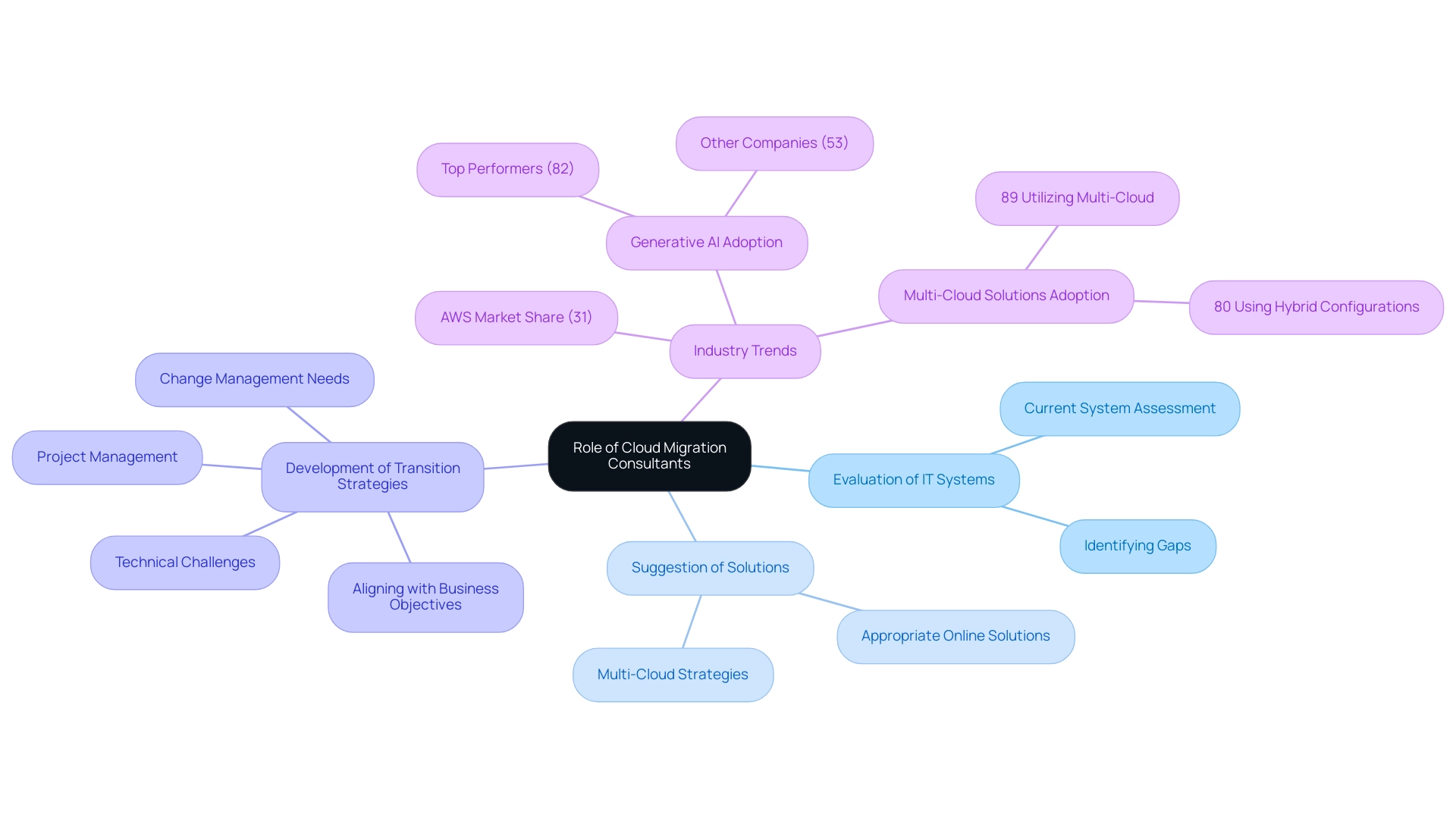
Why Cloud Transformation Matters: Benefits for Businesses
A cloud transformation and migration consultant can showcase a wealth of advantages for businesses, drastically enhancing scalability, driving significant cost savings, fostering improved collaboration, and bolstering security. According to Veeam, "22% of IT leaders perceive economic uncertainty as a major obstacle to executing digital transformations," which underscores the necessity of a cloud transformation and migration consultant in developing customized strategies to navigate these challenges. With the capacity to rapidly adjust resources in response to fluctuating demand, organizations can minimize the substantial upfront investments typically required for physical infrastructure.
Recent insights indicate that businesses transitioning to online solutions are witnessing a reduction in operational costs. Furthermore, digital environments inherently provide advanced security measures, safeguarding sensitive data while simultaneously facilitating seamless remote collaboration among teams. A relevant example is the use of natural language processing (NLP) in simplified computing solutions, which makes management more accessible to a broader range of users.
This agility empowers businesses to innovate at an accelerated pace, allowing them to swiftly adapt to market dynamics and evolving customer needs with the guidance of a cloud transformation and migration consultant. As demonstrated by recent reports, the advantages of digital transformation are not just theoretical; they appear in concrete enhancements in operational efficiency and responsiveness, making the shift to digital technology a strategic necessity for innovative enterprises.
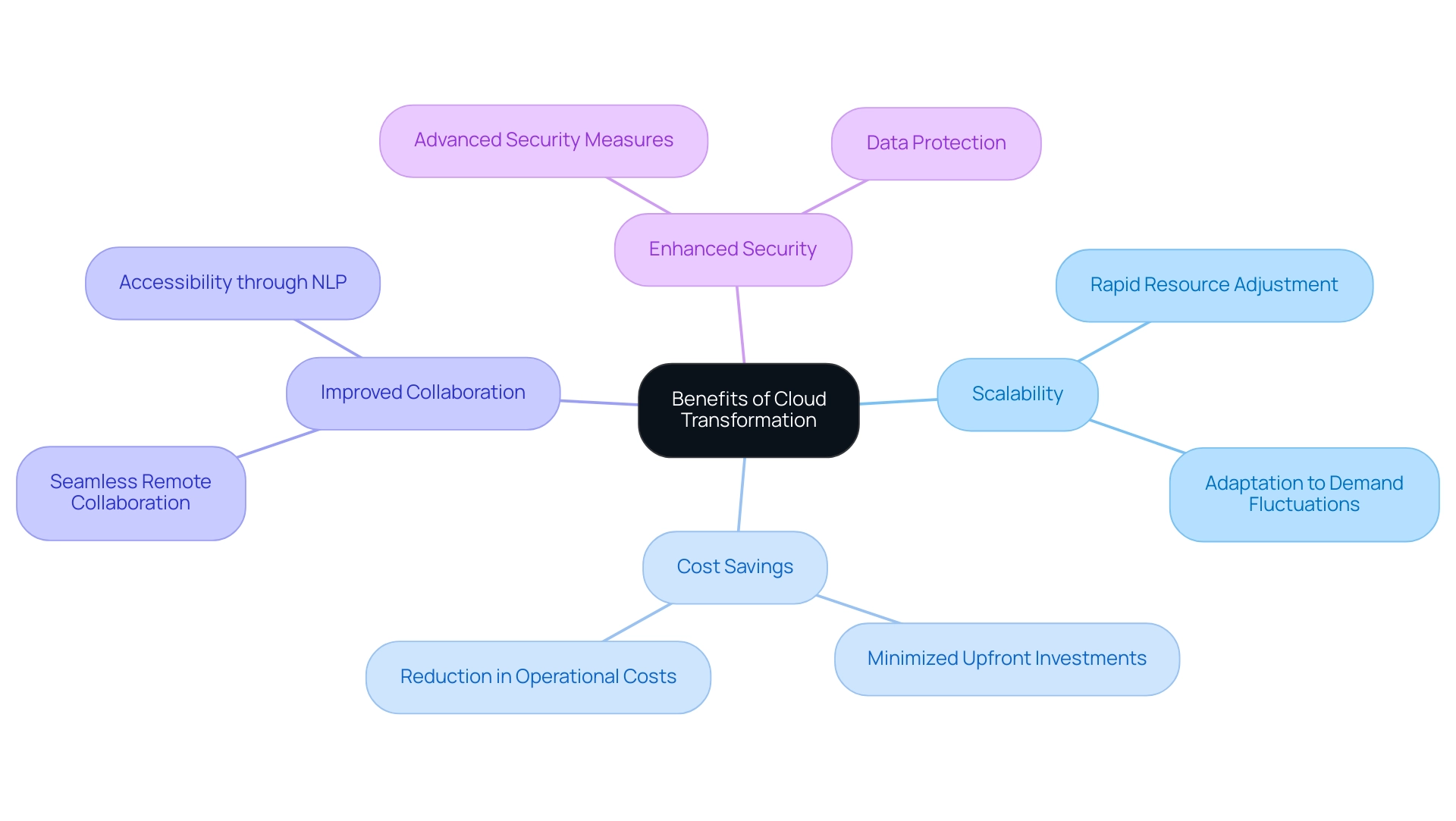
Navigating Challenges in Cloud Migration
While transitioning to online services offers numerous advantages, it also presents significant obstacles that organizations must navigate. Notably, data security concerns are paramount, as the integrity of sensitive information can be jeopardized during the transfer process. Legacy systems frequently create integration challenges with new online solutions, complicating the transition landscape.
As emphasized by Josh Howarth, Deloitte's survey of 400 commercial real estate executives shows that organizations are increasingly focused on investing in technologies that enhance their online capabilities while addressing these hurdles. Additionally, it is crucial to recognize that the U.S. and Western Europe represent 82% of the world's computing resources, highlighting the global importance of these transition challenges. Employee buy-in is another critical factor; resistance to change can impede the adoption of innovative technologies and processes.
Establishing zero trust requires implementing network segmentation practices and defining software-based micro-segmentation, which are crucial for maintaining data security during transitions. To tackle these complexities, a cloud transformation and migration consultant plays a crucial role in helping organizations recognize possible challenges early in the process. As a cloud transformation and migration consultant, they create tailored strategies to reduce risks, ensuring a more seamless transition to the online environment.
As the Infrastructure as a Service (IaaS) market is projected to grow at over 30%, with Google Cloud’s offerings expanding at an impressive 63%, the need for effective transition strategies becomes ever more pressing. Real-world case studies, like Drift’s successful decrease of its yearly technology expenses by $2.4 million, highlight the significance of strategic planning and execution in addressing these transition challenges.
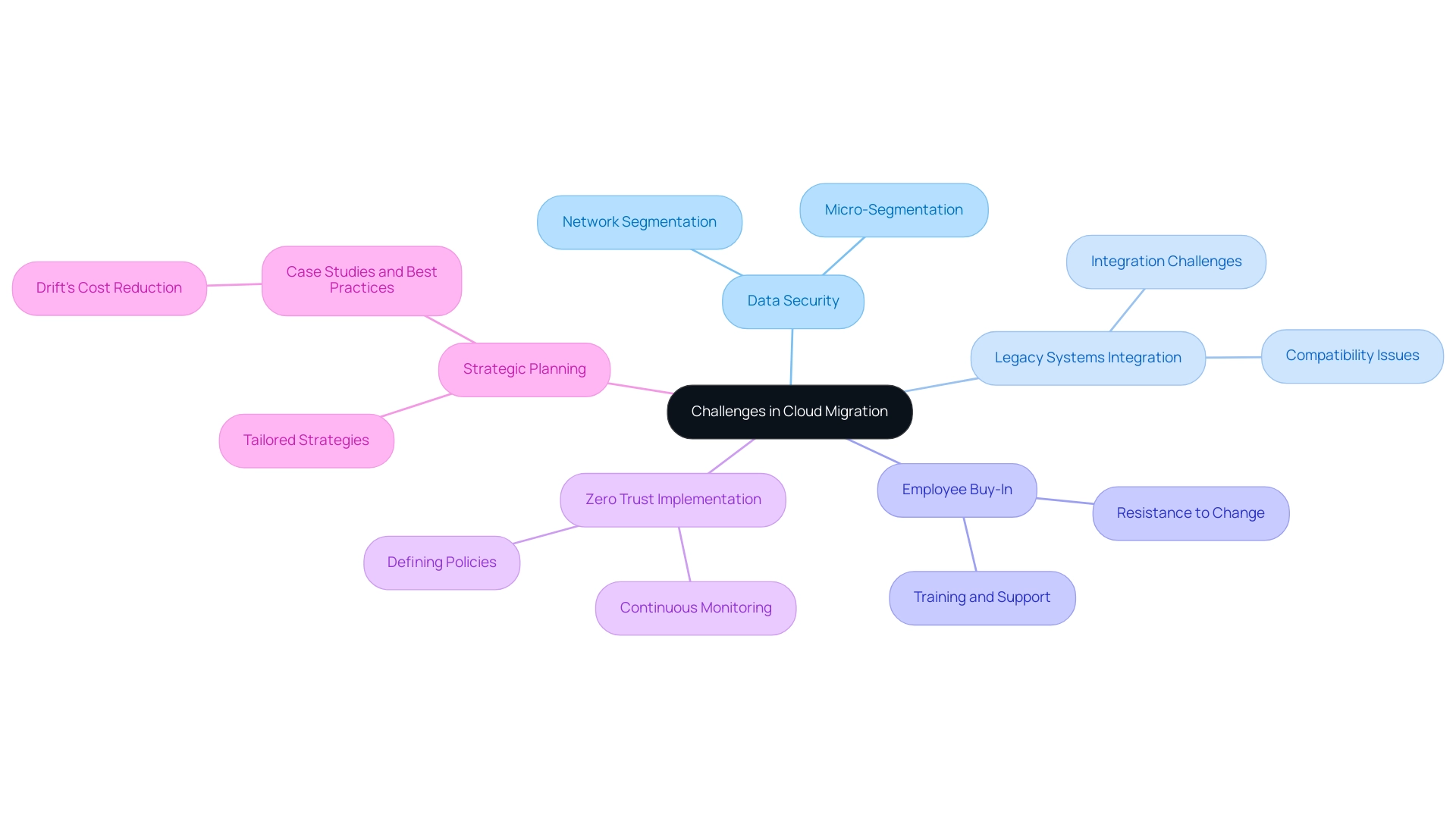
The Future of Cloud Migration Consulting: Trends and Innovations
The landscape of digital migration consulting is on the brink of a significant transformation, largely fueled by advancements in artificial intelligence, machine learning, and automation. In 2023, corporate information stored online represented an impressive 60% of total storage, reflecting a strong confidence in online security and reliability. As noted, 'In 2023, corporate data accounted for 60% of data stored online.'
These emerging technologies are set to streamline relocation processes, rendering them faster and more efficient than ever before. Furthermore, the adoption of multi-provider strategies empowers organizations to capitalize on the unique strengths of various providers, enhancing flexibility and mitigating risks associated with vendor lock-in. As enterprises increasingly prioritize digital transformation, a cloud transformation and migration consultant will be instrumental in navigating these innovations, ensuring businesses maintain a competitive edge in a rapidly evolving digital environment.
Notably, Applause's integration of CloudZero resulted in a significant 23% drop in expenses, exemplifying the tangible benefits of such strategic approaches. Additionally, organizations like Drift, Obsidian, and ResponseTap have successfully implemented cost management solutions, reporting substantial reductions in their online expenses. These trends underline the critical role of a cloud transformation and migration consultant in guiding efforts within a landscape where AI and automation are reshaping the future of cloud migration.
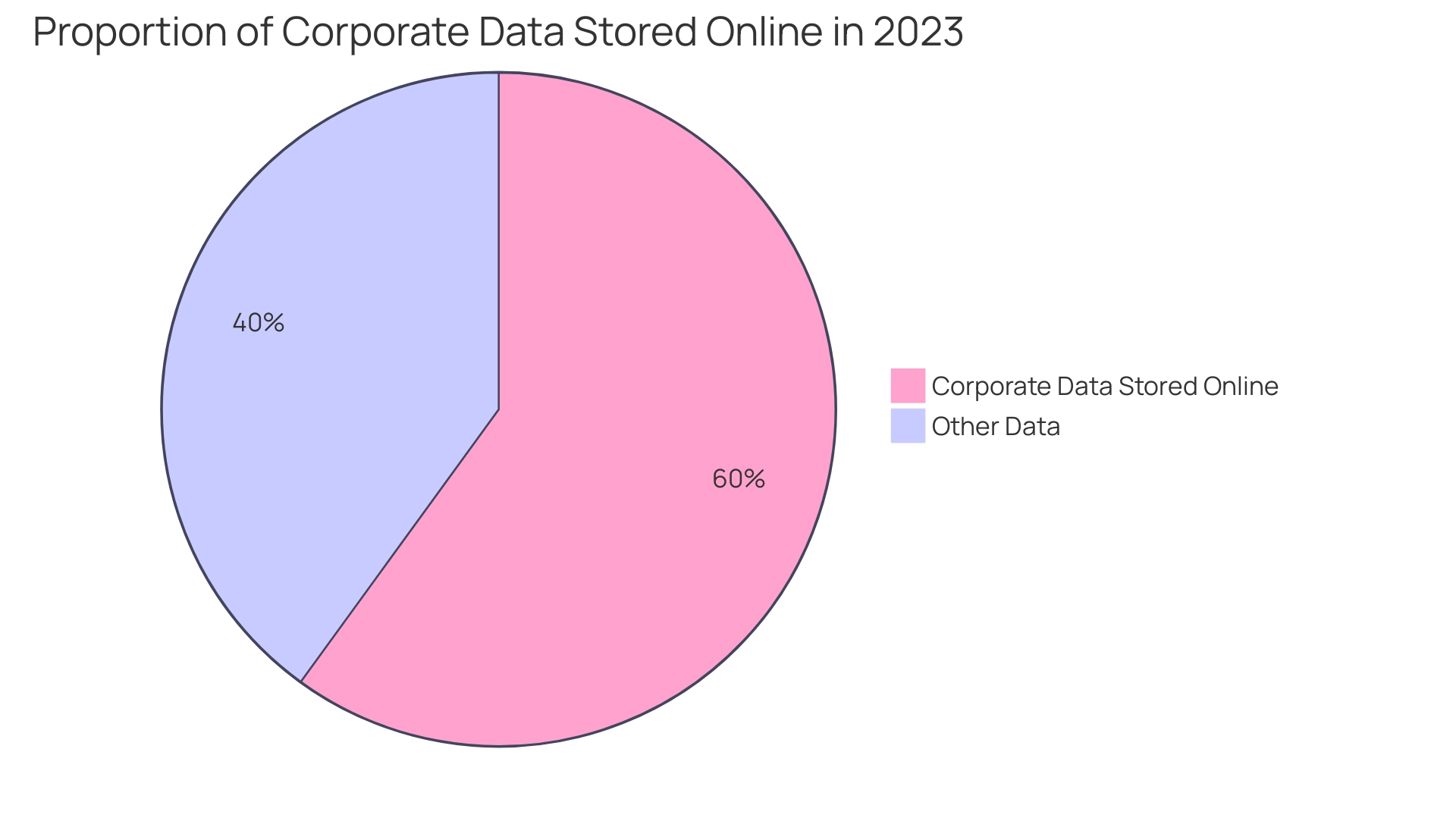
Conclusion
Embracing cloud transformation is crucial for organizations aiming to enhance operational efficiency and secure a competitive advantage in the digital age. The process of migrating to cloud environments is not merely a technical shift but a strategic endeavor that requires careful planning and execution. By leveraging various migration strategies, businesses can align their cloud initiatives with specific objectives, ultimately leading to increased flexibility, scalability, and cost-effectiveness.
The role of cloud migration consultants cannot be overstated; their expertise is vital in navigating the complexities of the transition. These professionals provide essential support in:
- Assessing existing infrastructures
- Recommending suitable cloud solutions
- Managing the intricacies of change management
As organizations increasingly adopt multi-cloud and hybrid cloud configurations, the demand for skilled consultants continues to grow, emphasizing their importance in mitigating risks and ensuring successful migrations.
While the benefits of cloud transformation are substantial, organizations must also address the challenges that accompany this transition. Significant hurdles include:
- Data security
- Integration of legacy systems
- Employee resistance
Cloud migration consultants play a critical role in identifying these challenges early and developing tailored strategies to facilitate a smoother transition.
Looking to the future, advancements in artificial intelligence, machine learning, and automation are poised to revolutionize cloud migration consulting. As organizations prioritize digital transformation, the insights and guidance provided by cloud migration experts will be integral in harnessing these innovations effectively. The continued evolution of cloud technologies underscores the necessity for businesses to adapt and embrace expert consultation to thrive in an increasingly complex digital landscape.




